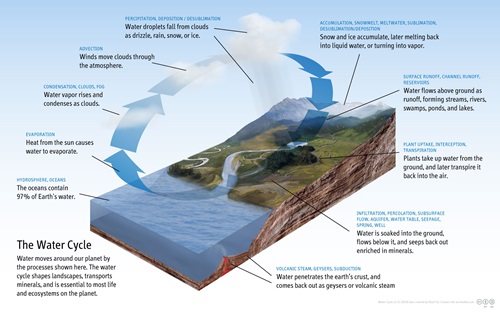Water & Our Changing Environment
In the United States, we enjoy an almost universal access to clean, safe, and abundant drinking water — distributed by both public and private regulated utilities. But that relationship with this essential resource is changing, and what we’ve largely taken for granted is under threat by environmental and societal changes. The more we understand these changes, the better equipped we’ll be to act — for a safe and secure water supply for ourselves and future generations.
The Water Cycle
Understanding water begins at the highest level with understanding the water cycle, or hydrological cycle. It describes the continuous movement of water in its various states (liquid, solid, vapor) on, above, and below the surface of the Earth. During every step of its epic travels, our planet’s water cycle provides the very essentials of life.
The quantity of water on our planet remains constant, but its rate of movement and distribution varies drastically. For instance, water evaporating from oceans can return to the ocean in the form of rain in a matter of days. But if that water were to fall on land or on ice caps as snow, it could take thousands of years to make its way back to the ocean through underground aquifers or melting glaciers.

click to enlarge
Source – Wikipedia
We often naively think the Earth has an abundance of water, and that we’ll never run out. But 97% of the Earth’s water is held in saltwater oceans, with less than 1% available for human use – in freshwater lakes, rivers, and groundwater sources. Increasingly, human activities are rendering some of these sources unusable due to critical depletion, salinification, and pollution. And now climate change is one more factor affecting the supply of water we depend on.
More Information
There’s plenty of information online to help you learn about water, the environment, and climate change. Wikipedia is a good place to start for general information, and these sites can provide information more specific to the U.S.